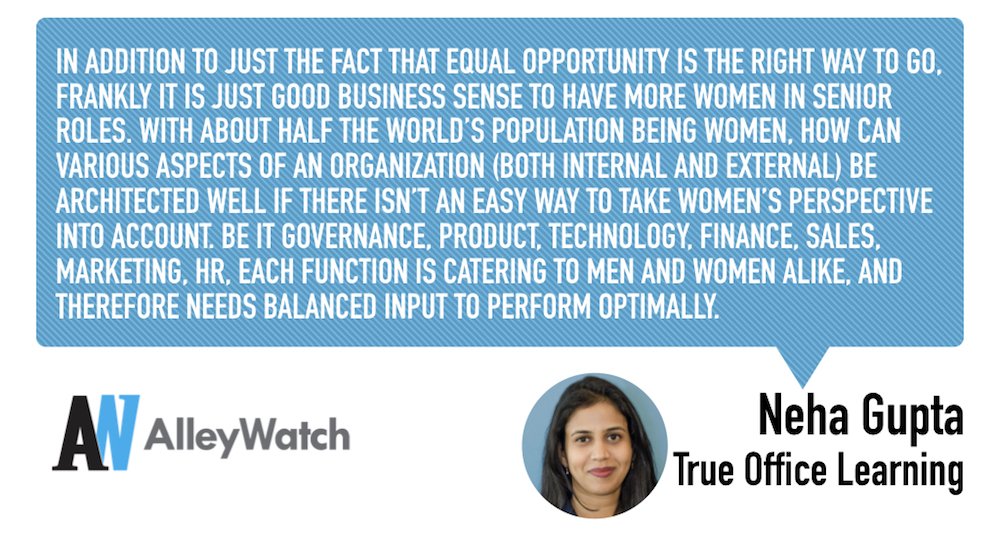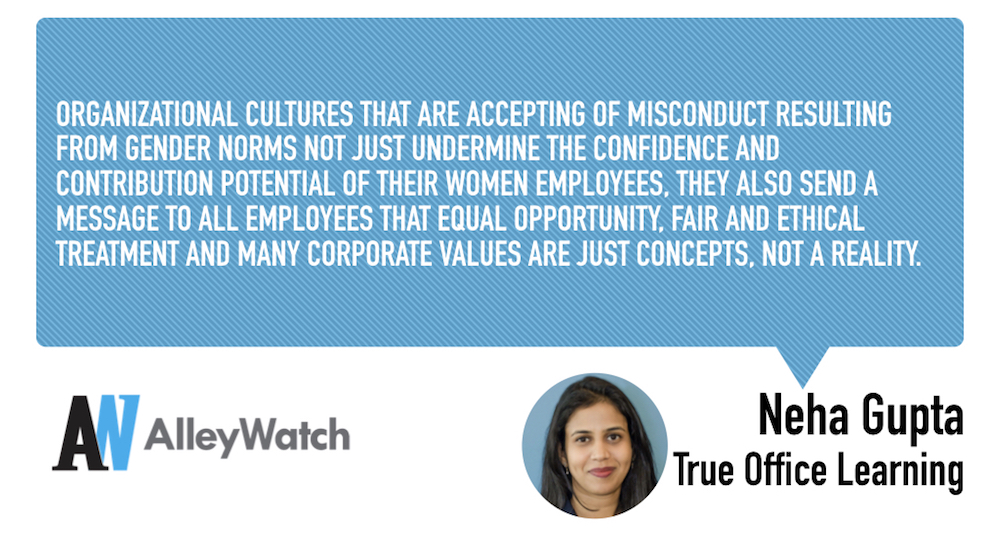Are you a woman in NYC Tech and interested in participating in this series? Make sure to read the whole article…
Much has been said and written about the lack of women in the tech sector, be it as investors (or associates), founders, or in management positions at major companies. Is the problem the old boys’ network – or that success in technology is seen as a young man’s game? In this series, we speak with some of the top women in tech in New York as they discuss the challenges they face, the perceptions that need to be changed and the work that’s being done – or not – to help to promote women in tech.
Today we are joined by Neha Gupta, the CEO of True Office Learning, a leading enterprise education and analytics company. Neha is an engineer by training and before joining True Office Learning, she oversaw the operations for a large division at Citigroup. She left the corporate world to join True Office, which was initially acquired by the NYSE and rebranded as NYSE Governance Services. Last year, private equity firm Marlin Equity Partners acquiredNYSE Governance Services, changing the name to True Office Learning and appointing Gupta as CEO . To date, she is the only female CEO in the private equity firm’s portfolio.
AlleyWatch spoke with Neha to learn more building her path to CEO and how she is trailblazing the way for women in tech.
What’s your background and how did you develop your career as a female entrepreneur in the NYC tech ecosystem?
I’m an engineer by training and a born problem solver so building a company from the ground up felt like a natural step in my career journey. While we don’t always talk about it, I have always viewed the enterprise as a key part of society, given how most of us spend a large percentage of our lives at work. Because of this, it’s been important to me to use engineering and strategy to improve and strengthen business environments over the last 10 years in publishing, non-profit, consulting, insurance and financial services.
The one thing that I have seen consistently be true in every organization is that it is only as strong as its people. Unfortunately, most enterprises are unable to successfully help employees become better at what they do. Why do we stop teaching people consistently after college?! This is especially true when it comes to dry but significant business areas like ethics & compliance, change management, business processes etc. where learning and continuous improvement are key steps to the journey. With the enterprise learning solutions stuck somewhere between power point and video with only completion/quiz scores as measurement, I had to find a better way to improve performance and outcomes. This search for a market-ready answer for empowering employees to “learn by doing” and obtaining behavioral analytics insight is what led me to True Office, and the NYC tech ecosystem.
I’m happy to say that we have since created a ground-breaking adaptive learning and behavior analytics platform that is genuinely driving cultural change and greater ethical performance within organizations.
 What are the advantages of being a woman in tech?
What are the advantages of being a woman in tech?
While there are definite tactical advantages of having a different perspective than many of my male tech colleagues, one of the biggest advantages of being a woman in tech is that you can always feel like a trailblazer. As the only female CEO in our Private Equity owner’s portfolio, I feel like I’m creating space for more female executives within this portfolio of tech companies…and beyond. My hope is that by creating that space, being a female CEO in the tech space isn’t a novelty in the not so distant future.
What can be done to further promote female entrepreneurs and women in tech in New York?
Mentor, mentor, MENTOR! I know this isn’t groundbreaking, but we need to go beyond the lip service we pay to the importance of mentoring and actually find mentees…and be open to mentees that find us. Having the ability to soundcheck ideas, work through business problems and learn industry nuances from their experiences is a key part of helping women not just enter the tech space but thrive within it. A great example of this is the Fintech Innovation Lab, led by Maria Gotsch, which provides an even playing field for promising Fintech startups to access deep industry expertise and structured mentorship from the most senior levels within the Wall Street banks.
While all-female peer and mentoring groups are great, it is important to remember that getting diverse inputs is key to long-term success. Men will always be a key part of the business landscape, and their perspective and support are equally valuable in becoming a better entrepreneur and tech contributor.
What is diversity to you and do you see it evolving in tech?
Diversity to me is less about the composition/distribution of demographics (ex. gender, race, backgrounds etc.) in a group and more about having different perspectives at the table and providing a safe space for each of those perspectives to have an equal voice, so decisions can be made optimally. Because a better distribution of demographics provides a greater likelihood of different perspectives, people often make the mistake of assessing diversity by composition. The real measure is to assess how much collaborative participation, debate, and challenge of ideas you see from not just a few, but all members of a group. While it is definitely evolving for the better in tech due to globalization and greater awareness around diversity in organizations, there is still a long way to go.
Why do you think it’s important that women retain, grow, and develop into senior roles within their organizations?
In addition to just the fact that equal opportunity is the right way to go, frankly it is just good business sense to have more women in senior roles. With about half the world’s population being women, how can various aspects of an organization (both internal and external) be architected well if there isn’t an easy way to take women’s perspective into account. Be it governance, product, technology, finance, sales, marketing, HR, each function is catering to men and women alike, and therefore needs balanced input to perform optimally. Similarly, when looking for individuals to lead and drive change, organizations do themselves a disservice if they are focusing on only half the talent pool.
As a woman, it is very important for each of us to continue to grow and pursue more senior roles, because every day, you are helping other men and women have the confidence that women can lead and thrive within the organization.
It’s statically proven that women-led companies are more successful than their male counterparts. Why do you think they still only get 2% of funding available for new ideas?
Because…patriarchy! Decades of social conditioning that women are primary caregivers or their first priority is family are key factors in the success to funding ratio mismatch we are currently experiencing. Another factor that can come into play is the confidence gap between men and women. As can be seen from Zenger Folkman’s research, women are pre-disposed to lower confidence levels, especially in early years of their career, which can also often impact investor confidence.
How much do you think casual sexual harassment and misconduct affects a woman’s career?
While you could argue that there is a spectrum of sexual harassment that ranges from less severe to truly horrific…let’s be clear, the less severe end of the spectrum creates space for the truly horrific end of the spectrum. Because of that, no sexual harassment is casual. We have to end that thinking- now. Organizational cultures that are accepting of misconduct resulting from gender norms not just undermine the confidence and contribution potential of their women employees, they also send a message to all employees that equal opportunity, fair and ethical treatment and many corporate values are just concepts, not a reality.
Women experiencing misconduct in the workplace should always raise their voice, either directly or indirectly depending on the severity of the situation. Gone are the days of just putting up with it. As we can see all over the media, Time’s Up.
What can men do to support this movement and/or participate in this discussion?
The most significant way men can support this movement and/or participate in this discussion is by leading by example. A first step is to evaluate their own actions and positions on how they and their peers interact with/respond to their women colleagues and identify what conscious or unconscious biases may exist. The next step is to find constructive ways to bring about positive change through dialogue, informal influencing or direct confrontation depending on the situation. If more senior and/or in a leadership position, they need to ask themselves if the cultural tone they are setting, the policies they are creating and the metrics they use to measure success effectively create a fair and balanced work environment for all that will lead to optimal results.
And while it isn’t fair, men do need to remember that they need to keep doing this despite times/interactions that make it seem like all men are viewed as the problem. This endeavor is about building a better world, and therefore we much each do our part and keep moving forward.
The team at AlleyWatch believes it’s important to have an inclusive discussion around the challenges facing women in tech along with highlighting the work of the female entrepreneurs that have made NYC one of the best places for women in tech according to some recent studies. That’s why we are running this series that showcases women in tech in New York.
If you are a female founder in NYC working in tech and interested in participating in the series please visit this link or click on the image above.
Please feel free to pass this on to any women in NYC that you feel should be considered for the series. Thank you.





